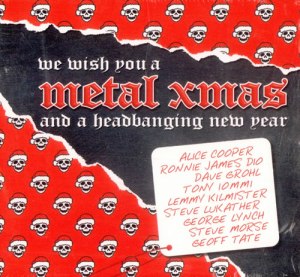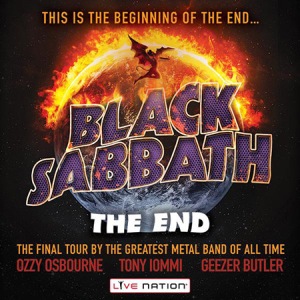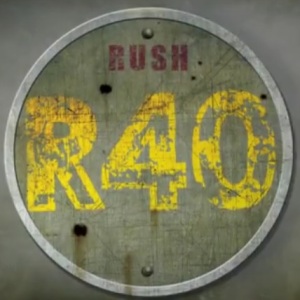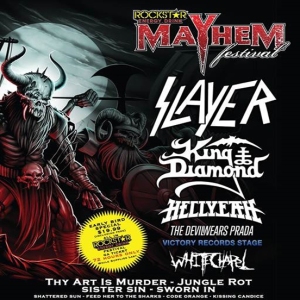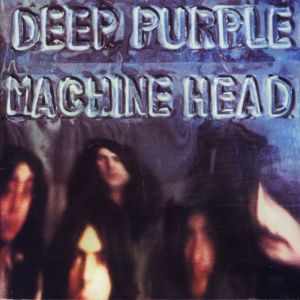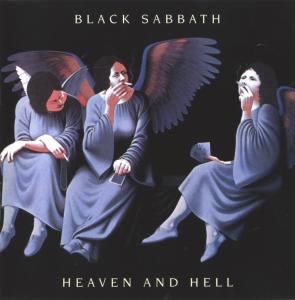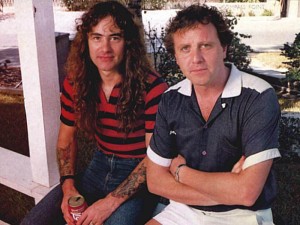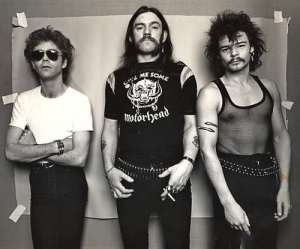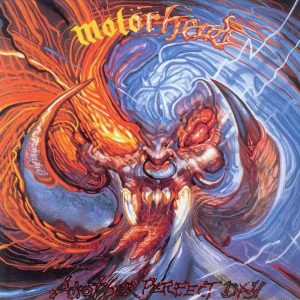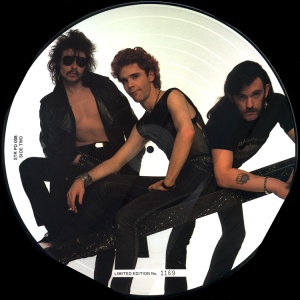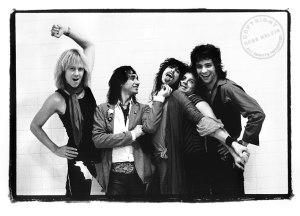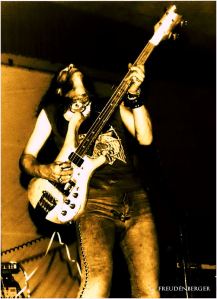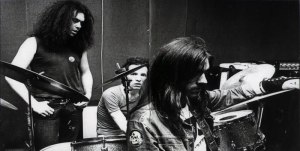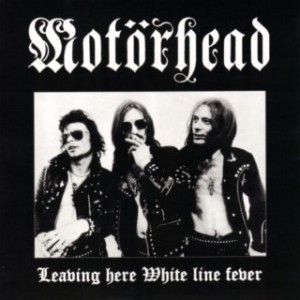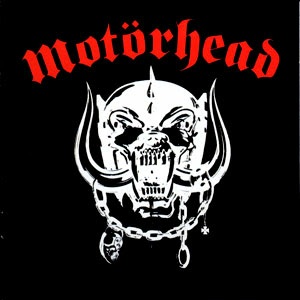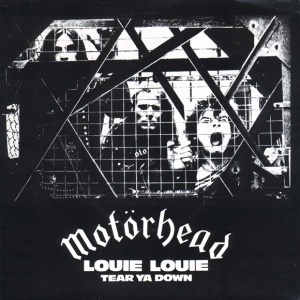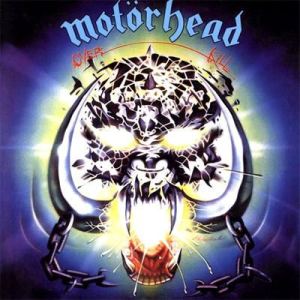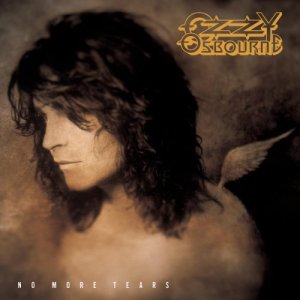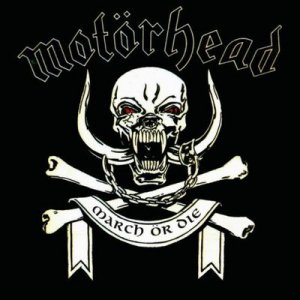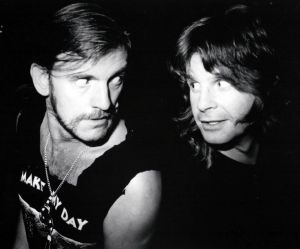“I was on tour with Hawkwind in 1974, we were staying at the Riot House (the Hyatt Hotel in Los Angeles) and Roy Wood and Wizzard were also in town. I got this urge to write a song in the middle of the night. I ran downstairs to the Wizzard room, got Roy’s Ovation acoustic guitar, then hurried back to mine. I went on to the balcony and howled away for four hours. Cars were stopping and the drivers were listening then driving off, and there I was yelling away at the top of my voice.” – Lemmy
And there you have it: The origin of a hugely significant song, one that inextricably connects Lemmy’s history with Hawkwind to his subsequent success with Motorhead. Originally positioned as a non-album single B-side, the song would eventually became a ‘hit single’, rising to #6 in the UK singles chart.
The song in question was named for the American term for speed freak: ‘Motorhead’. One could therefore easily deduce exactly what kind of drugs Lemmy was on on that night in LA; I’m no expert, but suddenly being struck with an urgent need to write a song in the middle of the night and bellowing off a balcony at the top of your lungs for four hours may indicate the use of speed. Well, they say ‘write about what you know’, and Lemmy did just that. ‘Motorhead’ is a snapshot of what was happening in Lem’s head during that late-night writing session:
Sunrise wrong side of another day, Sky-high and six thousand miles away
Don’t know how long I’ve been awake, Wound up in an amazing state
Can’t get enough and you know its righteous stuff?
Goes up like prices at Christmas
And of course, no examination of Lemmy’s ‘Motorhead’ lyric would be complete without a mention of the infamous ‘parallelogram’ line:
Fourth day, five day marathon, We’re moving like a parallelogram
Don’t move, I’ll shut the door and kill the lights, If I can’t be wrong, I must be right
I should be tired, and all I am is wired, Ain’t felt this good for an hour
‘Moving like a parallelogram’? YES. When you do drugs with Hawkwind, everything moves like a parallelogram. Speaking of drugs, the fact Lemmy’s ‘Motorhead’ would appear as the B-side of Hawkwind’s ‘Kings of Speed’ single confirms some previous assumptions about the band’s drug use. Beyond the obvious ‘speed’ reference, the ‘Kings’ lyric also makes reference to cocaine:
Between you and me Mr. C, I think we have what these boys need
We guarantee you the sweetest ride, You’ll go so far you’ll think you’ve died
The biggest attraction, the brightest star, Boys you’re going fast and far
Kings of Speed, Kings of Speed, We’re gonna make you, Kings of Speed
‘Motorhead’ was the perfect compliment to ‘King’s of Speed’, as the songs are clearly linked thematically, making the single a kind of musical tribute to amphetamines. It would also be the last song Lemmy Kilmister would ever write for Hawkwind, as Lem would be fired in June the following year. Excerpts from a short piece in the NME from June of 1975 gives us insight into Lemmy’s firing, and the significance of speed to this time period in The History of Lemmy:
“Sacked. I was sacked. We were going from America to Canada and I had two grammes of Sulphate. They thought it was cocaine. A bit later I was called to Dave Brock’s room. They were all sitting there. I was told I was being sacked. I said ‘Thanks very much’ and left the room. I must tell you I was Upset. Tears Were Seen. Anyway, I pleaded Not Guilty and the charges were dismissed. After all, it wasn’t the Big C — only Biker Sulph, which ain’t illegal in Ontario.”
Lemmy further explained that his new band would “concentrate on very basic music: loud, fast, city, raucous, arrogant, paranoid, speedfreak rock n roll … it will be so loud that if we move in next door to you, your lawn will die”. While he first considered naming his band ‘Bastard’, an allusion to his recent firing, ultimately he decided to see the title of his final contribution to his previous band: ‘Motorhead’. As he moved on, he also took the song itself with him and reshaped it for his new project, with great vengeance and furious anger.
‘Motorhead’ the song has been re-recorded by Motorhead the band three times, features on two of the band’s official live albums, and many alternate versions of the song – by both bands – have appeared as bonus tracks on ‘Deluxe’ re-mixed/re-mastered versions of the original classic records. I count no less than eleven versions of ‘Motorhead’ that I consider worthy of your attention. Here they are, in the order that they were originally recorded:
‘Motorhead’ Version 1 / Instrumental by Hawkwind, from the ‘Warrior on the Edge of Time’ sessions, 1975
umbling to life with a patented Lemmy Bass Intro, the first recording of ‘Motorhead’ lopes along at a friendly, almost laid-back pace. What makes this version interesting is that, in the absence of a lead vocal or guitar solo, the energetic bass strumming of frustrated guitarist Lemmy can be clearly heard in certain sections. Laid bare like this, the simplicity of the song’s riffs and overall arrangement reinforce a stark contrast between most of Lemmy’s songwriting contributions to Hawkwind and the trippy prog/jam sound that characterized most of the band’s music.
‘Motorhead’ Version 2 / Brock Vocal by Hawkwind from the ‘Warrior on the Edge of Time’ sessions, 1975
Say what you will about Lemmy’s …unique… vocal stylings, but Hawkwind founder Dave Brock’s vocal take is blah. Maybe it’s just that we’re so used to Lemmy belting out this tune, but Brock’s somewhat thin voice lacks character and his lazy approach to the lyric’s rhythms dulls the impact of a song that’s supposed to be all about the manic intensity of an amphetamine high. The guitar solo here may have been just a ‘scratch’ take, and not intended to be retained, as it’s completely unfocused and aimless; though backed with Hawkwind’s warped electronic sound effects, it actually kinda works.
‘Motorhead’ Version 3 / Single version by Hawkwind, B-Side of ‘Kings of Speed’ single, 1975
This is the first recording of the song that anyone outside the band ever heard. The WotEoT Deluxe liner notes state that Lem had lost his voice when it was time to record the vocal to his song, and Brock stepped in and sang Lemmy’s lyrics, completing the tune. Apparently Lemmy wouldn’t have it, and he eventually laid down his vocal, job done. Not to be outdone, Lemmy added a lower harmony, which lurks beneath the main vocal and lends the lead vocals an ominous tone. Another major difference from the previous two iterations is the inclusion of a violin solo. You read that right. Welcome to Hawkwind.
‘Motorhead’ Version 4 / Dave Edmunds Demo by Motorhead, 1975
With Larry Wallis on guitar and Lucas Fox on drums, we have arrived at the very first version of ‘Motorhead’ actually recorded by Motorhead. Compared with the Hawkwind version from earlier in the year, the tempo is juiced, the energy level is way up, and harmony vocal is gone. Lemmy’s vocal performance is spirited and the guitar flourishes by Wallis bring the song squarely into Hard Rock territory. In my humble opinion, this is the ‘best’ studio version of this song. A pity Dave Edmunds, producer of the demo, didn’t stick around to do the album that followed…
‘Motorhead’ Version 5 / UA ‘Debut’ Album Version, 1975
This problematic version is the opening track on what would have been Motorhead’s debut. Recorded in 1975 but shelved by United Artists, the record was ultimately released as ‘On Parole’ in 1981 to cash in on the smash success of Motorhead’s ‘No Sleep ’til Hammersmith’, which entered the UK charts at #1. Side One/Track One opens with the sound of a motorcycle roaring to life, obscuring almost all of Lemmy’s bass iconic bass intro; the annoying bike noises continue well into the song. The ‘production’ on this version is questionable at best, with its tribal drums and droning guitar overdubs rendering this version an unfocused mess.
‘Motorhead’ Version 6 / Chiswick Debut Album Version, 1977
Because Motorhead’s very first version of ‘Motorhead’ (the 1975 demo) was unheard for 22 years, and the second (UA album version) was locked away for six years, this third Motorhead version of ‘Motorhead’ that the general public would hear. With the classic ‘Three Amigos’ line-up of Lemmy, Fast Eddie Clarke, and Philthy Animal Taylor in place, the band recorded this version during a whirlwind weekend session in 1977 that was supposed to produce a 2-song single; instead, the session yielded this song, plus 12 additional backing tracks.
Eddie tells it:
“That was Friday night, so we had all Saturday and Sunday. We’d been playing these songs for a year, so we thought fuck it, we can do an album. In a few hours we had all the backing tracks down. Put the vocals down. Bit more speed, put some more guitars on. Few more beers – we were fucking steaming. Come Saturday night, we’d nearly finished it.”
Speed, indeed! Even the producer’s name was Speedy Keen. Management agreed to up the budget and a full album was completed.
Rough and ragged, this take on the band’s namesake song sounds very punk and has a live ‘warts and all’ (no pun intended) feel. When the band crashes in to the song proper, and Phil’s hi-hat work and Eddie’s wall of sound guitars meshing with Lemmy’s trebley bass savagery, it’s clear: while still in its primitive stages, there’s something special happening here. Eddie’s hyperactive solo is the icing on the cake: Motorhead have arrived. Lem’s lead vocal carries a bit more rasp than usual; yours would too if you’d double-tracked vocals for 12 songs in 48 hours. This version was also released as the band’s first official single, with their version of Larry Wallis’ ‘City Kids’ on the flip, in June of 1977.
‘Motorhead’ Version 7 / Chiswick Session Alternate Take, 1977
Unearthed and included with a 40th Anniversary re-release of the ‘debut’ album in 2017, this alternate take is even more frantic than the album/single version, but probably wasn’t used due to the fact that Eddie applies a an echo effects pedal midway through his solo, and then a flange pedal near the end, which he never de-activates, allowing the effect to continue throughout the entire 2nd half of the song. The vocal is not doubled, and Lemmy’s lead vocal sounds great, although this take was likely abandoned early in the sessions.
‘Motorhead’ Version 8 / ‘No Sleep ’til Hammersmith’ Album Version, 1981
Recorded on March 29, 1981 during the ‘Ace Up Your Sleeve’ tour in 1980 in Newcastle. The Three Amigos had come a long way since their ‘debut’ appeared in 1977, rapidly evolving into the unstoppable wrecking machine heard on their first official live album ‘No Sleep ’til Hammersmith’. Lemmy intros the band’s final encore with a tossed-off ‘Just in case…’, and unleashes that classic 4-string intro, his bass approximating the sound of the flaming metal wreckage of the Hindenburg impacting the ground. The band sounds absolutely vicious throughout. This recording was also released as a single, unedited, with one minute plus of ear-piercing, squalling feedback and air raid sirens at the song’s end retained from the album version; it peaked at #6, becoming Motorhead’s highest-ever charting single.
‘Motorhead’ Version 9 / ‘No Sleep til Hammersmith’ Alternate Version, 1981
Also intro’d with a ‘Just in case…’, this one is a bit more ‘unorganized’ than the ‘No Sleep’ version discussed above, but overall quite similar, as it was recorded on March 30, at a second Newcastle City Hall show. This was released in 2001 in a 2-CD ‘Complete Edition’ of ‘No Sleep ’til Hammersmith’, which compiled an alternate version of the ‘No Sleep’ album with unused recordings from the Leeds and Newcastle shows. As is usually the case when tracks that didn’t pass muster the first time around are hauled out as bonus tracks, these tracks are interesting, but not up to the standard of the material chosen for the official album.
‘Motorhead’ Version 10 / ‘The Birthday Party’ Live Version, 1985
This version is surprisingly tight, considering there were 9 people on stage playing it together! For the final song during Motorhead’s Tenth Anniversary gig at London’s Hammersmith Odeon, the 2-guitar version of Motorhead – Lemmy, Wurzel, Phil Campbell, and Pete Gill – are joined by Phil Taylor, Eddie Clarke, Brian Robertson, and Lucas Fox – every previous member of Motorhead with the exception of Larry Wallis. Wallis didn’t make it, but that was fine; his spot was taken by none other than Thin Lizzy’s Phil Lynott! Employing 5 guitarists, 2 bass players and 2 drummers (Fox played guitar here, not drums), this rendition could have completely fallen apart, but it all hangs together well, as this mob bulldozes through the old warhorse and does it proud. This show was released on CD and VHS in 1990; sorry, no legit DVD or Blu-Ray exists.
‘Motorhead’ Version 11 / Guitar Hero III Video Game Version, 2008
For the next iteration of ‘Motorhead’, we have to jump forward almost 25 years, and into the video game era. In 2008, the song was recorded by would would be the final line-up of Motorhead: Lemmy, Phil Campbell and Mikkey Dee. This version was released as downloadable content for the Guitar Hero III: Legends of Rock video game, along with new versions of “Stay Clean” and “(We Are) The Road Crew”, so once again, this song may be an entire generation’s introduction to the magic of Motorhead. This take absolutely rages, and while there’s a definite modern metallic sheen to the proceedings, all of the punk-ish elements in the song remain intact, 30+ years after it’s inception. This track was added to the posthumous covers compilation ‘Under Cover’ in Japan as a bonus track in 2017… But was this really a cover?
‘Motorhead’ was not a song that appeared very often in Motorhead’s live set, even in the early years. Perhaps it’s because the song’s structure and feel are somewhat outside of what would become the ‘Motorhead sound’; lyrically, it’s 6,000 miles away from the much more grounded lyrical output Lem would pen for his band. I mean, in the end, it’s really a Hawkwind song, isn’t it? But the opposite argument could also be made: ‘Motorhead’ is really the very first Motorhead song, it’s title and lyric encapsulating the renegade spirit and chemically-enhanced manic intensity that would fuel Lemmy’s career from that moment forward; it’s music embodying the garage-punk Rock n’ Roll attack that he would harness and hammer into the mean machine called Motorhead.
By the way… I would so buy this album!



